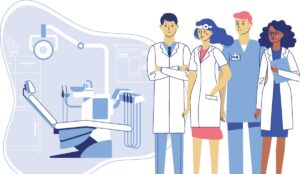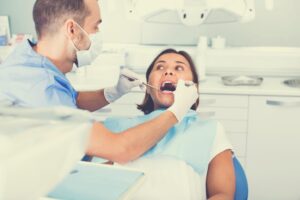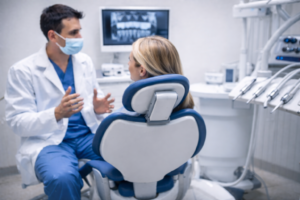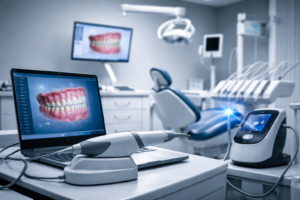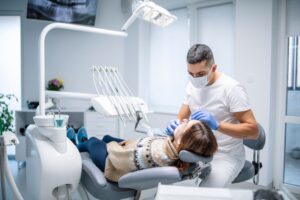Conversations Dental Professionals Should Avoid | Patient Communication Guide
In order to understand what not to say to dental patients, it is just as important as knowing what to say. Every word from a dental professional holds weight, whether it’s reassuring, clear, or confusing. In an era where patient expectations are high and online reviews can make or break a practice, your words need to be sharp, intentional, and professional.
This blog talks about dental communication tips. These aren’t just awkward moments to avoid; they’re real mistakes that can damage trust, raise anxiety, and even push patients out the door.
Why Words Matter More Than You Think
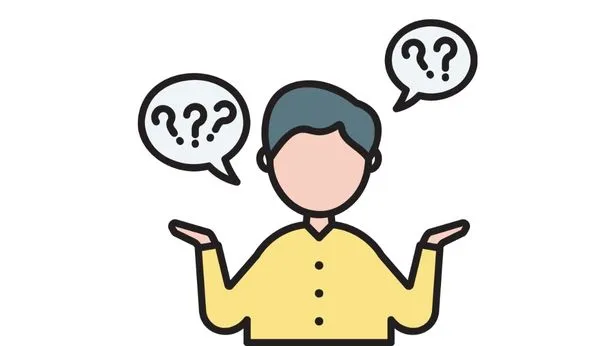
In a dental setting, patients are vulnerable. They’re reclined, sometimes in pain, and often anxious. Your tone, expressions, and language can either calm their nerves or trigger more stress. Mastering dental chairside manners isn’t just polite, it’s strategic. It builds trust, increases treatment acceptance, and makes patients feel respected and heard.
Also Read: Dental Staff Training Tips: How to Develop Dental Team Skills
Conversations Every Dental Professional Should Avoid
But too often, dentists and hygienists slip into casual or clinical speech that lands wrong. Below are the things dentists should avoid saying, with better alternatives and the reasoning behind each one.
1. “This won’t hurt.”: It might seem comforting, but this phrase is a trap. If the procedure does hurt even slightly, you’ve lost credibility. It also suggests pain is expected, which raises tension. Patients hear this and brace for the worst.
What to say instead:
“You might feel some pressure here, but let me know if you’re uncomfortable.” This sets realistic expectations and opens the door for communication.
2. “Oops.”: A fear word, but a dangerous one in a clinical setting. Saying “Oops” makes patients think you’ve made a mistake. Even if it’s minor, like dropping a tool, it triggers an alarm.
What to say instead:
Keep calm and redirect. “Let me just adjust this real quick.” Or simply say nothing unless necessary. Composure is everything.
3. “You should’ve taken better care of your teeth.”: Shame doesn’t motivate; it shuts people down. Many patients already feel guilty or self-conscious about their oral health. Judging them will likely ensure they don’t come back.
What to say instead:
“Let’s talk about some ways to improve things moving forward.” This keeps the focus on progress, not blaming an essential part of patient communication in dentistry.
4. “This is the worst I’ve seen.”: Even if it’s true, saying it is unprofessional and discouraging. It makes the patient feel hopeless and embarrassed. It turns your role from healer into critic.
What to say instead:
“We have some work to do, but we’ve got a plan.” Confidence and clarity over exaggeration.
5. “Insurance probably won’t cover this.”: This adds financial stress before they even understand the procedure.
What to say instead:
“We can check your insurance benefits and discuss all the options together.” You shift from a dead-end to a collaborative, patient-first mindset essential in mastering dental communication tips.
6. “This is going to be expensive.”: Saying this primes patients for sticker shock and puts a price wall in front of care.
What to say instead:
“Let’s talk about the treatment plan and costs together. There are options to make it manageable.” Again, collaboration builds trust.
7. “Just relax.”: Telling an anxious patient to relax rarely works—it often makes them feel dismissed.
What to say instead:
“I know this can feel uncomfortable. Let’s take it one step at a time.” Acknowledging discomfort is a powerful part of good dental chairside manners.
8. “You need to…”: This feels commanding and paternalistic. Patients don’t want to be told they want to be involved.
What to say instead:
“Here’s what I recommend based on what we’re seeing: how does that sound?” Partnership, not authority, leads to better outcomes.
9. “At your age, this is normal.”: It may sound clinical, but it can come off as dismissive.
What to say instead:
“Many people in your age group experience this, but there are ways we can treat it effectively.” Always end with solutions, not resignation.
10. Any type of gossip or personal judgment: Avoid talking about other patients, staff drama, or inappropriate personal views.
What to say instead:
Even if the patient agrees with you, they’ll wonder what you say about them when they leave. It erodes professionalism and makes you seem untrustworthy.
Final Call: Speak to Heal, Not to Impress
Your words matter as much as your clinical skills. Mastering what not to say to dental patients takes practice, but the payoff is huge: more trust, higher treatment acceptance, and loyal patients who recommend you to others. Great dentistry starts with great conversations.
Want to level up your dental chairside manners and become a communication pro? Whether you’re a new grad or a seasoned pro, mastering these skills is essential for any dental team member or anyone working through a dental placement agency. Contact Hire Smiles to find qualified professionals who elevate every patient experience.
FAQs on Conversation of Dental Professionals
Q1. Why is communication so important in dentistry?
Communication is important because patients judge your competence by how you make them feel, not just your technical skills.
Q2. Does poor communication impact acceptance of agreed services?
Definitely. Confused or anxious patients are much less likely to commit.
Q3. Is it better for the dentist to talk less and listen more?
Absolutely. Active listening helps create reports and permits personalized treatment discussions.
Q4. Is it professional to make jokes with patients?
Good-natured humor is fine, but read the room. Some patients will not appreciate any element of humor.
Q5. What if a patient begins to become rude or aggressive?
Remain calm, assertively outline boundaries without being rude, and document the incident.
Q6. Is it helpful to use scripts in the communication process with patients?
Scripts are a three-star starting place; they must be adjusted to your voice and to who the patient is.
Q7. Can the appointment staff impact the patient’s trust?
Absolutely. Communication is a team process from the front desk and through the entire appointment.
Q8. How can I educate my team so they become better communicators?
Start with regular role-play, patient feedback evaluations, and scheduled training sessions.
Related Article: Cultural Sensitivity in Dentistry: Key Challenges and Solutions
